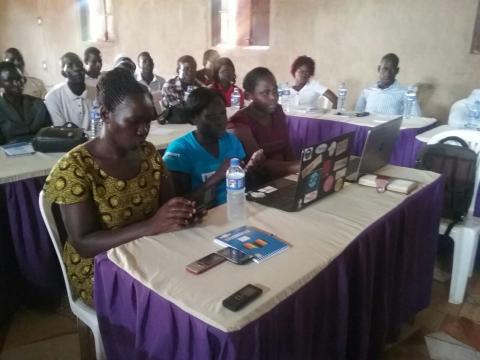CBOs Launch Online Platform To Fight Corruption, Poor Service Delivery
Submitted by Christopher Tusiime on

Two Community Based Organisations (CBOs), Anti-Corruption Coalition Uganda (ACCU) and Parliament Watch Uganda, on Thursday lauched "Yogera" an online platform to help combat corruption and poor service delivery in the country.
Accessed from www.yogera.ug or via their Facebook page (yogeraUg) and Twitter (@YogeraUg), the platform was developed by Hive CoLab technologists who are patnering with the said CBOs with funding from Indigo Trusaid UK, and British Council. It's also aimed at anabling residents in Ugandan to hold their leaders accountable, and also show support for those who decline bribes for the good of society.
"Yogera aims at informing people about their rights, provide an easy way to report corruption or poor service delivery, demand government response, and to champion public sector workers who resist corruption," said Roy Mukasa a team member from ACCU, adding that only Kampala residents can use the service for now as plans to spread it to other districts get finalised.
HOW IT WORKS
According to Mukasa, the platform is very easy to use. One needs to have internet access and follow instructions on the website.
"After Opening the Yogera website, scroll down and one will see the 'report a situation/shame a corrupt person' button," Mukasa said. "From there, three spaces will be provided: in the first one, type the name of the person being reported about, the second one is for describing the act, while in the third, you can paste there a link to evidence that may already be on internet... then click on 'report' and we shall receive the information and follow up with the responsible person. Those on social media can simply inbox all the information and we shall still get it."
Mukasa said that Uganda has in recent past made various efforts to establish systems to fight corruption, including a strong legal framework, but actual implementation of corruption prevention has been weak.
“In Uganda, corruption is widely considered a problem, across a range from demographics, from students to taxi-drivers, shopkeepers to watchmen,” Mukasa said, Adding: “Few people are aware of their rights; many people have paid or continue to pay bribes on a regular basis. For example, we have learned about school girls who have bribed to get good grades, and others who have bribed to get medical treatment – the list goes on and on.” Mukasa said this must stop.
He added that with Yogera which translates to "speak up"in English, even people who feel insecure about their lives for bringing forth corrupt individuals are also allowed to anonymously report evidence of corruption via the above stated sites, and their team will immediately take action.
"Once a report is made, the Yogera team will follow up with the responsible district leaders or relevant authority to ensure that the matter gets resolved. And once it has been resolved, the team reports back to the online community," He explained, adding there is a "Celebrate my Hero" button on the platform which allows people to recommend those who have promoted a culture of decling bribes.
He said this way, they hope citizens will be encouraged to report about all the incindents of failure to provide services by responsible people and cases of bribery because of the change they think will result from online reporting and timely feedback given to those who complain.
The director of Hive CoLab,
Barbara Birungi said: “Technology presents us with huge opportunities to foster a culture of transparency and accountability. In places where corruption is a social norm, citizens need to work together to shift those norms. It is difficult for individuals to stand alone against corruption. Yogera provides an easy and safe way for them to do it together, and start to change norms”.
Similarly, Women of Uganda Network (WOUGNET) also on Wednesday launched a similar platform, m-Omulimisa, which uses SMS service to enable rural Ugandans address poor service delivery so as to foster citizen engagement in good governance.
To access m-Omulimisa, one needs to type their concern about service delivery and then send it to 8228 as an SMS, or by visiting www.wougnet.org/ushahidi/. The platform is integrated with the crowd mapping platform Ushahidi. service is currently accessed by only residents of rural Northern Uganda, in the districts of Apac, Kole and Oyam.
While lanching the service at Judini Hotel in Apac district on July 27, Gorreti Amuriat, Programme Manager Gender & ICT Policy Advocacy Program at WOUGNET said: “Historically, information about service delivery and accountability has been in the control of the district political and civil service leaders which has been hampering collective sharing of information and address local problems.
We want to show how ICT tools such as mobile phones, radios and internet can be inclusively used as tools for engagement in which local communities hold their leaders accountable on service delivery and corruption. Via m-Omulimisa, sending stakeholders SMS messages about service delivery issues increases the pressure on local authorities/duty bearers and will stimulate action."
Amuriat said that despite tremendous growth in Uganda’s ICT sector, the uptake of new technologies is hampered by poor infrastructure, low literacy levels, high access costs and lack of local online content, particularly in rural areas.
Grace Acheng, a local resident from Chegere Subcounty in Apac district said: “Our districts face regular service delivery problems, such as impassable roads, bridges that have washed away, absentee school teachers, low quality building construction at schools, and lack of medicines at our health centres. m-Omulimisa gives us a way to report these problems, as well as corruption issues.”
Recently, WOUGNET made substantial progress in fostering citizen engagement and government accountability, via various projects. Examples include the repair of poorly maintained borehole pipes at Awiri Parish in Chegere Subcounty, Apac district, and the construction of new toilets at Amilo Primary School in IIbuje Subcounty, both in response to community reports which were then escalated to relevant officials.
- 808 reads
